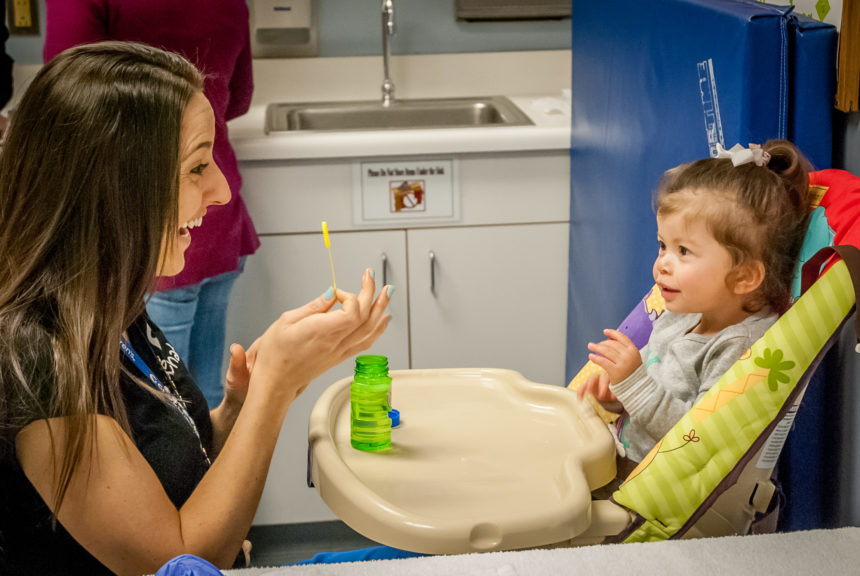In honor of Better Speech & Hearing Month, we spoke to Nicole Paine, who has been an outpatient speech therapist at CHOC for 4 years, working with patients with feeding and swallowing disorders, speech delays, brain injuries, and vocal cord dysfunction. She also works in CHOC’s Early Developmental Assessment Center , a resource for families with children born early or who had difficulties at or shortly after birth, who are concerned about their child’s development. Speech and language pathology at CHOC helps children develop or improve their speech, language, memory and attention, breathing, and feeding and swallowing in a state-of-the-art rehabilitation center.

Q: Why did you want to become a speech therapist?
A: I have always had a passion for working with children and the special needs population. One of my previous jobs was a special education classroom assistant and one-on-one aide. I was able to see speech therapy firsthand with my student every week. I loved how functional, beneficial, and enjoyable it was for him. I asked his speech-language pathologist questions about the field, borrowed textbooks from her, and sought out additional observation time. I went forward with pursuing a post-baccalaureate degree in communicative disorders and eventually my master’s. Each class and internship I completed made me more confident that this was the field for me!
Q: What part of being a speech therapist are you most passionate about?
A: I love the individual time I get to spend with each patient and their family. It is so rewarding to work together as a team to overcome difficult issues like oral feeding aversions, behaviors, and communication difficulties. Being a part of patient progress is the best part of my job. Whether the progress is big or small, it is all about helping each child reach their best potential. I am also incredibly lucky to work with such a talented team of speech-language pathologists, occupational therapists, and physical therapists that share my same passion. I love the collaboration on multidisciplinary teams that takes place here at CHOC.
Q: What advice would you offer someone considering pursuing a career in speech therapy?
A: I would suggest interviewing and observing speech-language pathologists in action as much as possible. Our scope of practice is so broad that there are endless opportunities, therapy approaches, and settings to work in. Some college or graduate school programs will allow prospective students to sit in on a class or two. It doesn’t hurt to ask!
Q: What attracted you to CHOC?
A: While in graduate school I was lucky enough to be accepted into CHOC’s full-time outpatient internship program. I knew CHOC was well-respected for many reasons, but was finally able to see that first hand. For 12 weeks I observed, learned, and worked alongside my speech-language pathologist supervisor, treating patients and diagnoses of a wide variety. I lived and breathed what working at CHOC would be like. It was challenging, rewarding, and a ton of fun! There are endless learning opportunities here and I always felt supported by the rehabilitation services team.
Q: What else should people know about speech therapy?
A: People often think we exclusively treat articulation disorders, like making ‘r’ or ‘s’ sounds. We actually can treat a variety of different deficits including fluency (stuttering, cluttering), language (spoken and written), literacy, social skills, cognition (attention, memory, problem solving, reasoning), voice, resonance, auditory rehabilitation (speech delays due to hearing loss), feeding, swallowing, and breathing. It’s typical in a medical setting such as a children’s hospital for speech-language pathologists to treat many patients with feeding and swallowing disorders. Speech-language pathologists need specific education and specialized training by mentors and continuing education courses to work with such patients. We’re able to treat feeding and swallowing disorders in addition to speech because we have extensive knowledge of the mouth and throat anatomy and physiology.
Learn when to ask your pediatrician for a referral for speech or language therapy.





